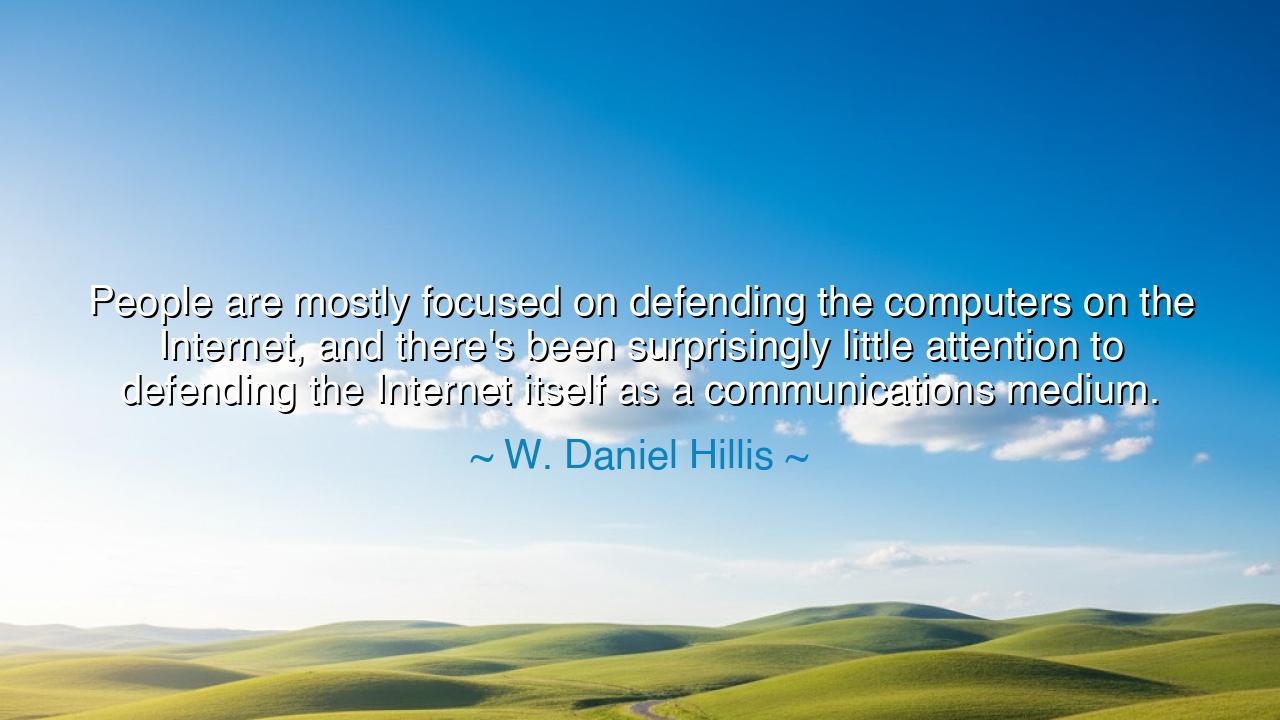
People are mostly focused on defending the computers on the
People are mostly focused on defending the computers on the Internet, and there's been surprisingly little attention to defending the Internet itself as a communications medium.






“People are mostly focused on defending the computers on the Internet, and there's been surprisingly little attention to defending the Internet itself as a communications medium.” — thus spoke W. Daniel Hillis, a visionary of the digital age, whose words ring like a bell tolling in the fog. He warns not of a single system, nor of a fleeting danger, but of the foundation upon which all modern civilization now rests — the Internet itself, the invisible web that binds together the thoughts, commerce, and dreams of humankind. His words are both lament and prophecy, reminding us that while we polish the armor of our machines, the bridge that connects them all trembles beneath neglect.
In the days of old, the ancients built great roads — the Roman highways that stitched together an empire. Soldiers guarded the cities, treasuries, and palaces, yet few thought to guard the roads themselves. But when the invaders came, and the roads fell into ruin, commerce withered and knowledge scattered like leaves in the wind. So too is our Internet, the great highway of modern thought. It is not merely a network of machines, but the artery of civilization, through which truth, art, and wisdom flow. To defend only the computers — the cities — while neglecting the pathways that connect them, is to misunderstand the nature of what sustains us.
Consider, O listener, the tale of Estonia in the year 2007. A nation proud and newly free, it was struck by a cyberattack unlike any seen before. Government portals fell silent, banks ceased to function, and communication faltered. No walls of code could save the infrastructure, for the attack was aimed not at a single computer, but at the network itself. It was as though an unseen hand had grasped the nation’s voice and stilled it. In that silence, the world learned the truth of Hillis’s warning — that the medium, the great web of interconnection, must be shielded with the same vigilance as the machines that dwell within it.
The Internet is more than technology; it is the living pulse of humanity’s collective mind. It carries not only information, but emotion — laughter, outrage, tenderness, and memory. Yet it is fragile, a creation built upon trust and openness. When that trust is corrupted — when disinformation festers, when networks fracture under greed or power — the medium itself is poisoned. The danger lies not only in viruses of code, but in viruses of deception, division, and manipulation that erode the integrity of communication. To defend the Internet, therefore, is not only a technical task, but a moral duty.
Hillis’s words remind us that we are stewards, not merely users, of this grand web. The Internet is a reflection of our civilization — it mirrors our virtues and our vices. If we pollute it with hatred and falsehood, it will return that corruption to us magnified. If we protect it with truth and transparency, it will remain a vessel for enlightenment. The ancients tended their temples with care, knowing that neglect invited ruin. So too must we tend this temple of connection, built not of stone, but of signal and thought.
The lesson, then, is clear: do not look only to defend your device, but to preserve the fabric that unites all devices. This means supporting the principles of open communication, resisting censorship that silences truth, and standing guard against manipulation that twists discourse. It means investing in the resilience of infrastructure, teaching digital literacy as a civic virtue, and ensuring that the Internet remains a commons of knowledge, not a battlefield of exploitation.
To those who inherit this world of glowing screens and silent servers, take heed. The computers are but the vessels; the Internet is the sea upon which they sail. Guard it well. For if the sea becomes poisoned, no ship, however strong, shall survive its waves. Uphold honesty in your words, wisdom in your sharing, and vigilance in your defense. Thus shall the great network endure — not as a cage of chaos, but as a living bridge between souls, carrying the fire of human connection through the ages to come.






AAdministratorAdministrator
Welcome, honored guests. Please leave a comment, we will respond soon